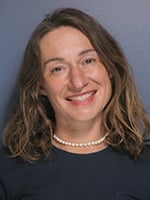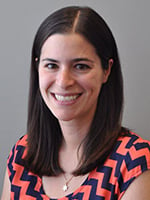During the early days of the COVID-19 pandemic, the stress and uncertainty weighed heavily on many of those on the front lines. Lilia Cervantes, MD, an associate professor of medicine at Denver Health and the University of Colorado Division of Hospital Medicine, and a physician-scientist, was one of the first to work in a COVID-19 unit. The night before her first shift at Denver Health, Cervantes, also a mother of two daughters, went online to make a will.
“Initially, there was so much uncertainty about the virus because there was little data. This was probably the most difficult time,” she said. “As hospitalists, we were among many clinicians on the front lines during the first week that COVID-19 hit Denver, and I personally was afraid of the uncertainty.”
Before the first pandemic surge in the spring of 2020, Cervantes was preparing to launch a small clinical trial focused on improving person-centered and clinical outcomes of Latinx patients with end-stage kidney disease on dialysis. With the risk of COVID-19 exposure mounting, the university and Denver Health announced on March 16 that all university buildings, including lab facilities, would be closed and most human subject research activities would be suspended.
Lilia Cervantes
With her National Institutes of Health (NIH) mentored research award (K23) and clinical trial abruptly placed on hold, Cervantes and her research staff were left in limbo. She attempted to pivot quickly.
Disproportionate burden of COVID-19
“I'm a Latina first generation physician researcher and I decided, that since my clinical trial was on hold, that I would focus all of my research time and energy on reducing the disproportionate burden of COVID-19 in the Latinx community,” said Cervantes.
In addition to continuing to work in the COVID-19 unit, Cervantes led several COVID research projects, while also providing support at home, as her 5th and 7th grade daughters were doing remote school.
The COVID-19 pandemic has disrupted the lives of many early-career faculty, like Cervantes, by altering the scope of their clinical responsibilities, reducing available support for academic activities, limiting opportunities for collaborative interactions, and increasing the burden of domestic activities.
In response to the challenges faced by Cervantes and many other early career scientists, the University of Colorado Department of Medicine recently announced it will provide $50,000 in funding to automatically extend mentored career development awards by six months for all eligible faculty.
“There is an urgent need for funding agencies, schools of medicine, and academic medical centers to realign their values and investments to address the challenges that the pandemic has imposed on our scientists and academic community,” says David A. Schwartz, MD, professor of Medicine and Immunology and the Robert W. Schrier Chair of Medicine at the University of Colorado School of Medicine.
Giving back lost career development time
In announcing the new funding extension program, Schwartz maintains that the Department of Medicine is taking actionable steps to protect and support this critical academic pipeline for research, and give back lost career development time for early career investigators.
Yael Aschner
“While the future of physician-scientists, early career scientists, and women scientists has long been recognized as in peril, the COVID pandemic has intensified these challenges that arguably threaten their career trajectories and consequently, endanger the very future of academic medicine,” said Schwartz.
Women in academics have been especially disproportionally affected by the pandemic. A recent large scale study affirms smaller studies that demonstrate there has been substantial declines in women’s research productivity during COVID-19, which could be attributed to more family duties at home. An analysis of COVID-19-related research in particular found that women submitted fewer COVID-19-related manuscripts in 2020 than men, especially in health and medicine journals.
When Cervantes learned about funding extension, she remarked there was a sense of relief.
‘Invested in my success’
“This represents yet another example that the Department of Medicine is invested in my success and is empathic of the additional burden COVID-19 has imposed on junior faculty and the trajectory and timing of their research,” said Cervantes. “This extra time and support will ensure that I have the protected time necessary to succeed in becoming an independently funded researcher.”
Like Cervantes, Yael Aschner, MD, experienced similar struggles as an assistant professor of medicine and early career physician-scientist in the University of Colorado Division of Pulmonary Sciences and Critical Care Medicine.
At the beginning of the pandemic, Aschner served as the first attending in the dedicated COVID Intensive Care Unit (ICU). With a lack of understanding of the disease, she worried about the health of her family, her children, and her parents in New York City, as well as her own health while working in the COVID ICU. However, she noted that hospital leadership at the University of Colorado Hospital always made sure providers had the PPE needed to stay safe.
Aschner and her husband also had to adapt to a new normal of remote learning for their daughter in kindergarten, and were faced with the dilemma of whether or not to continue to send their younger daughter to daycare.
Competing priorities
The competing priorities and stress of clinical work and home life were mixed in with her research work, which was also impacted. As an investigator in Acute Respiratory Distress Syndrome (ARDS) and pulmonary fibrosis, Aschner’s research activities were sidelined because they involved human subjects, or intensive personnel resources. Experiments were delayed due to lack of staff in the lab or her physical absence while in the ICU, or helping at home.
There were also lost opportunities for connection and collaboration with the cancellation of in-person scientific meetings due to the pandemic, which are critical forums for early-career physician-scientists to fortify networks and potential research collaborators.
“With those spring-time struggles, it was so hard to be productive even when I was physically allowed back into the research buildings. I felt needed at home and in the hospital, and it was a challenge to make time for academic work, and to then physically do that work,” she said.
With the announcement of the Department of Medicine’s funding extension program for early career researchers, Aschner said this will provide her a bit of breathing room from the stress of lost research productivity and missed networking and collaboration opportunities.
“This is an affirmation that the Department of Medicine values the work, both clinically and academically, of the early career investigators at our institution, and a validation of the essential role that we play in furthering the academic mission of the University of Colorado,” said Aschner.
Bridging the gap created by pandemic
As an active member of the ATS Assembly on Respiratory Cell and Molecular Biology Early Career Professionals Working Group, Aschner said the group has been discussing for months the kinds of actions that departments, schools of medicine, professional societies and the NIH can take to help early career physician-scientists bridge the gap created by the pandemic.
“This is exactly the type of program that we hope could be made available on a larger scale. I feel very fortunate to be a faculty member in a department that is at the forefront of this conversation and is actively working to find solutions, and to allay the real concerns of early career professionals,” said Aschner. “I hope this program will serve as a model for other academic institutions across the country.”
When the funding extension program was announced, Cervantes immediately tweeted the news to her 1,361 followers on Twitter. She remarked that the news spurred conversations by faculty across the country with the hope that the University of Colorado’s pioneer program will encourage other institutions and academic medical centers to take action.
“Our program is designed to sustain and ensure the success of our early career scientists, which represents one critical step in reinforcing the pipeline of scientists and scientific infrastructure, both of which are essential to the vibrant future of academic medicine and biomedical research,” said Schwartz. “To do nothing, or to continue the status quo, is not an option.”
Guest contributor: Holli Keyser, communications program manager, Department of Medicine



.png)
.jpg)
